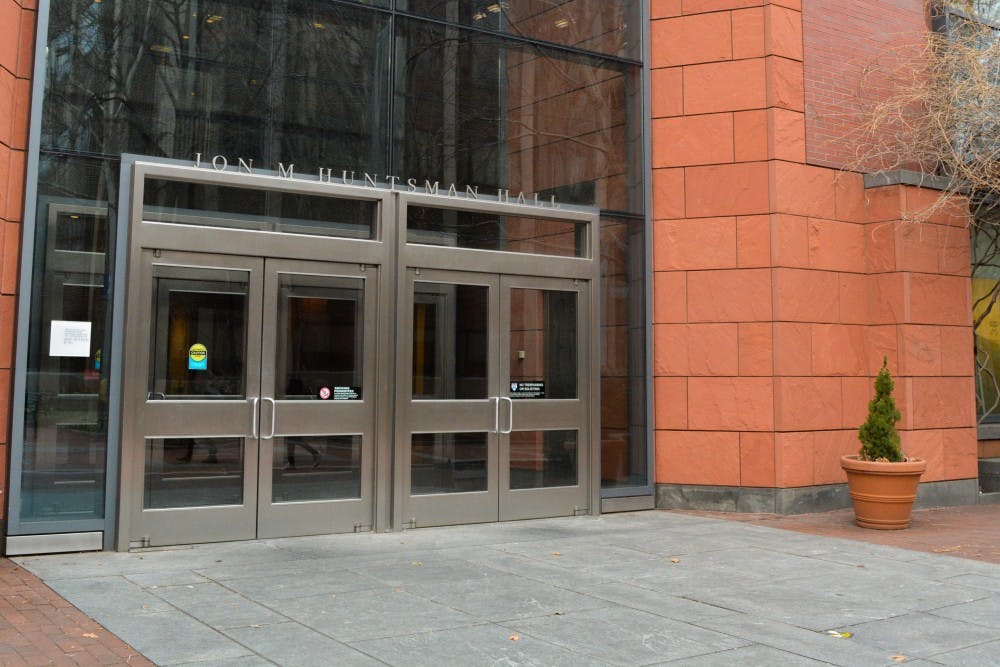
Returning to campus after summer break is supposed to be a fun and exciting experience. We get the chance to reconnect with college friends whom we haven’t seen all summer and revisit our favorite haunts on campus. There’s this amazing sense of familiarity with returning to what has become our second home, as well as a sense of excitement for what new experiences lie ahead.
We look forward to a new year with new classes and new adventures, but we do not look forward to new policies and regulations whose outcomes we were given no chance to change. Such was the case with the disastrous and surprising news that Huntsman Hall would be closing daily at 2 a.m. I’m not here to deliver a eulogy to Huntsman, but nevertheless, I must admit that I’ve probably spent more time in Huntsman than any other building on campus.
In Huntsman, I took classes, attended events, held club meetings, studied, and even socialized. Last fall I could be found on the second or third floor of JMHH every night, seven days a week. As someone who gets very stir crazy and cannot sit in the same spot for too long, Huntsman was an important place for me to work where I could drift between Quiet Study Lounges to computer labs to group study rooms to the curved desks lining the side halls of the second and third floors. Whether you wanted someplace quiet or loud, secluded or surrounded, Huntsman had it all. The dungeon at the bottom of Van Pelt simply does not compare, nor does it offer enough space for all of Penn’s students.
Now, Quakers must either argue with roommates over how late they can keep the lights on or stay up all night in residence hall lounges. The latter entails converting what were meant to be social spaces into study areas, further bleeding classwork into all aspects of student life, which is undoubtedly bad for mental health.
The real problem, however, isn’t that Huntsman is closing early; it’s that somehow the student body has no say in the matter. We go to a school where students are spending up to $75,000 a year for the privilege of having no say over their education or college experience. Somehow, an insulated bureaucracy within the school and a Board of Trustees comprised of rich donors make decisions that affect 25,000 students without any of us having a voice. It’s ironic to me that in the same city where our Founding Fathers birthed a new age of modern democracy, Penn ignores the voices of its students. Somehow President Gutmann, Dean Garrett, and the Trustees see it permissible to tax us without representation. Franklin would be appalled.
What is the point of having an elected student government if they are finding out about these policies by reading The Daily Pennsylvanian like the rest of us? I’m sure everyone loves airport shuttles during winter break, but for some reason I feel like this is the type of issue the Undergraduate Assembly should be allowed to decide on. The school encourages us to vote in Class Board elections where we get to hear about how every candidate will continue to host Econ Scream, Penn Holi, and Hey Day, so we end up voting based on how many friends and fraternity brethren post for them on Facebook, the quality of their music videos, and the aesthetics of their photos with Ben Franklin statues.
What we are not encouraged to vote on, nor even have an option to do so, is referenda concerning student life. Who remembers voting on whether administrators should send police officers clad in bulletproof vests and paid event observers to knock on the doors of fraternity houses last year? Who voted on whether off-campus groups should be forced to disclose their membership to the university? Whether or not we agree with these decisions, we deserved to have a voice in making them.
As students, we should be considered citizens of Pennlandia or at least shareholders of Penn Corp. considering we provided the school with $937.9 million of tax-free revenue, net of financial aid. I’ll even settle for being considered customers at this point if it means we have a say in school policies and are afforded the respect stakeholders deserve, instead of sold cost-savings as a mental health initiative.
The sad truth of the matter is that Penn knows it holds all the leverage. Tens of thousands of students will apply every year no matter what the administration does because we are told from day one that getting into the Ivy League will raise us above our peers and change our lives for the better. The only thing that could jolt the school into action would be if we threatened their revenue stream by all applying for transfer and mailing them our acceptance letters. For some reason, however, I sincerely doubt we would all commit to eschewing our elitism. I guess that means we must settle for reading the DP to find out that Huntsman is closing early.
AMIT GUPTA is a Wharton and Engineering junior studying bioengineering. His email address is agupta98@wharton.edu.
The Daily Pennsylvanian is an independent, student-run newspaper. Please consider making a donation to support the coverage that shapes the University. Your generosity ensures a future of strong journalism at Penn.
Donate







